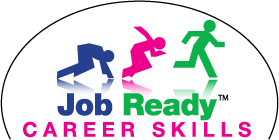The Teacher’s Desktop
Create Pre- and Post-Tests
The 100 questions available from the Topic you selected are displayed for your review so you can make choices about which questions to ask.
An (R) is shown when a Lesson is one you required when you set up your class. It is recommended that you choose questions only from Required Lessons.
You may ask the same or different questions in the Pre- and Post-Tests by clicking the appropriate columns.
Step 4c: Create a Pre- and Post-Test for Class: Work Readiness, 10 a.m.

The 100 questions available under this Topic with the corresponding Lesson title are displayed below.
For each question, decide whether you want to use the question on the Pre- or Post-Test, or on both. Check the boxes under the Pre-Test column to select the Pre-Test questions. Likewise, click the boxes under the Post-Test column to select the questions for the Post-Test.
When finished with this topic, click the button Save Pre-and Post Test Questions.
This demonstration has already selected questions for the Pre- and Post-Tests. You can review these questions below. Click here to continue.
